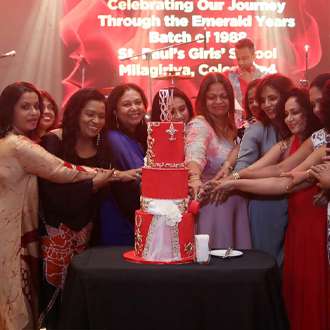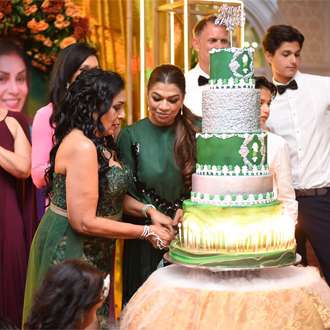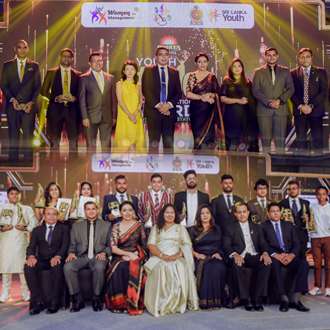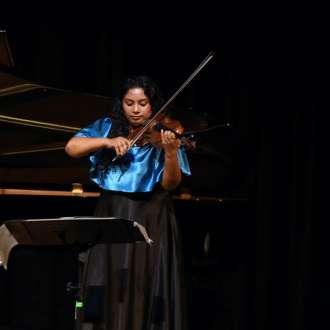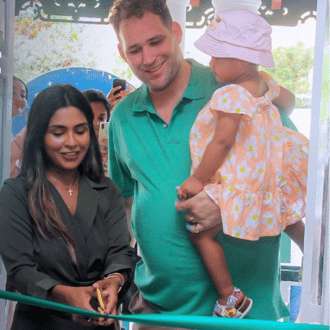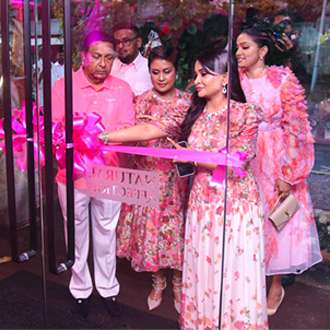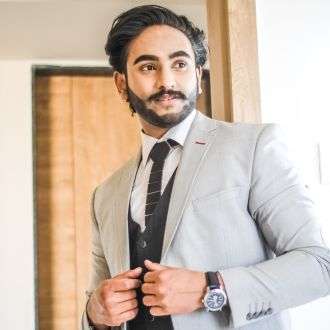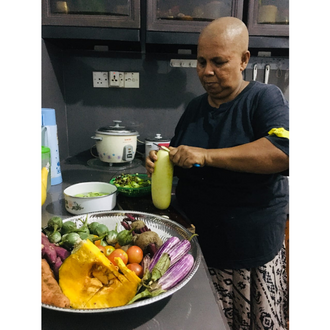
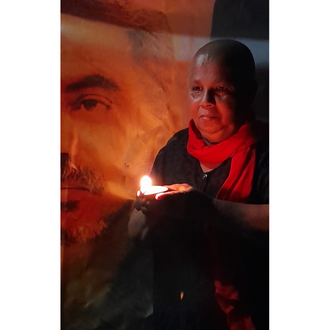
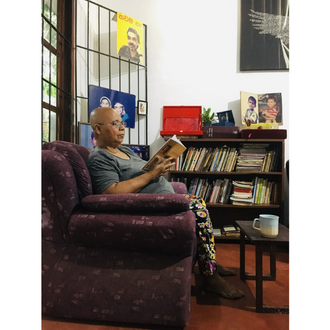
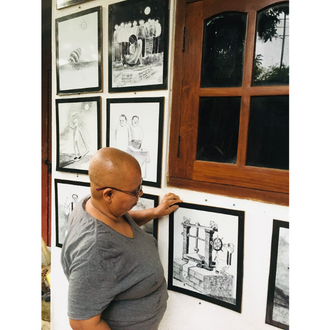
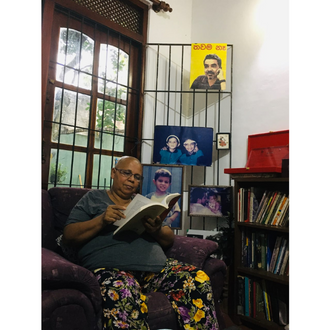
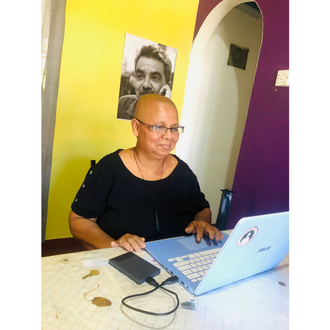
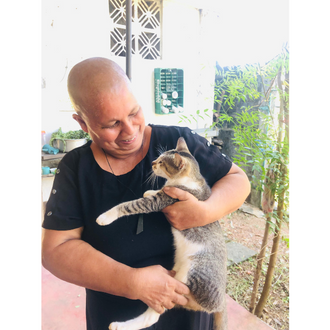
Imagine a society where men and women are treated the same. A community of people without prejudice, stereotypes, or discriminatory treatment. An environment that is different, fair, and includes everyone. An untroubled place where people appreciate and celebrate their differences regardless of culture, colour, language, educational background, or personal success. Then, imagine finding a person who cares so strongly about human rights that they devote their life to creating such an egalitarian society ... Meet Sandya Eknaligoda.
As the world came together to celebrate International Women's Day earlier this month and to honour all of the amazing women who live in it, we highlight the accomplishments of one woman, Sandya Ekneligoda, and chat with her about addressing the issue of missing persons, human rights, and her well-deserved place amongst “BBC’s 100 Women 2022”. This list identifies 100 of the most inspiring and influential women globally, reflecting the role of women at the heart of conflict around the world.
Sandya, thank you so much for joining us today, and congratulations on making the list! What was your reaction when you first heard the news?
Well, I received an email informing me that I had been chosen for the BBC's list of the 100 most powerful and influential women in the world in 2022. However, I was asked not to talk about it until it was officially announced. Anyhow, when I saw the message, a wave of emotions washed over me, including surprise, happiness, and a tinge of anxiety.
Being recognised as one of the top 100 women in the world was a great honour because it showed how much the BBC valued my contributions. It also made me realise the gravity of my own actions. I had, after all, done everything in my power, and in a way that I can be proud of, to help bring justice for my husband (who was abducted) and the collective struggle of those who have gone through the same experience. In 2022, I applied the utmost pressure against the Rajapaksas and directed it towards society too. However, I hadn't anticipated receiving any praise either before or after my acts.
The truth is that I am not a woman of high social standing or social class. I've faced court proceedings and a variety of other issues that have kept me from being well-liked or appreciated in my local community. Therefore, the BBC award made me very happy. I feel it is now a responsibility and that I owe it to them to protect the trust they've placed in me. To give you an indication of how ecstatic I was, I told my physiotherapist the good news that day because she could see how I was so excited.
I know that you've been very much involved in addressing the issue of missing persons, especially those still unaccounted for in the aftermath of Sri Lanka's civil war. Can you tell us something about the difficulties you have faced in locating people or seeking to uncover the fate and whereabouts of those who remain missing? Do you have some positive stories to share about reuniting families?
For three decades, Sri Lanka has been torn apart by war in the north and several violent conflicts in the south. Besides, it's a nation where forced disappearances have been a problem for four decades, where the victims are still looking for their loved ones and fighting for justice. In the same way, authorities have used enforced disappearances as a tool for the oppression and intimidation of citizens at various points in history. In fact, in terms of the number of people reported missing, Sri Lanka was only surpassed by Iraq in the figures from 2014 to 2015.
Look at it this way, I am just a little speck in the midst of all those victims looking for their loved ones and amongst the organisations and individuals campaigning for human rights over the past 40 years. Their voices and activities, though, were very strong and proved to be enough to wear down the rulers and those who are accountable, just as the little cicadas' constant chant wears out people's ears.
Like every other victim out there, I had to contend with a state that gave impunity to criminals who were in charge of all authority in Sri Lanka. I too became a victim when my husband, (journalist Prageeth Ekneligoda) was 'forcibly disappeared'. I don’t know whether there are accurate statistics on missing persons in Sri Lanka. There are, I believe, discrepancies among statistics from different sources. However, according to those published by Amnesty International and several other organisations, more than 100,000 individuals were the target of an organised effort to have them vanish in Sri Lanka.
Regrettably, I have never come across any cases of victims of abduction being reunited with their loved ones, and sadly I know of more than 50 mothers who have died without ever catching a glimpse of a resolution to their misery, as they held photos of their loved ones close to their chests while looking for justice.
The recent earthquake in Turkey and Syria, reports of migrants dying on Europe's borders, and the current conflict between Russia and Ukraine: such catastrophes continue to highlight the suffering of families who lose contact with their loved ones, and the pain of not knowing where they are or if they are safe. How possible is it to offer comfort and hope to those left behind when a family member disappears, when in reality their situation may simply mean years of uncertainty?
The people of both Turkey and Syria have been enduring the agony of the enforced disappearance of their loved ones, and fighting for justice, for years. The disaster that nature has now unleashed on them is absolutely devastating. But due note must be taken of failures on the government’s part to take preventive measures to mitigate the intensity of the disaster, specifically in terms of enforcing building standards and evacuating the endangered area before the disaster struck.
Meanwhile, people who enjoy no security in the country where they were born and the land that they love are fleeing to Europe in search of safety. It’s like a person who is about to drown in water will grab onto even a blade of straw to save themself. What a cruel atrocity, that these refugees seeking asylum in Europe end up dying at the border. Can you imagine that? I ask this question of those dear Europeans who love all the people and children of the world.
As for the Russia-Ukraine conflict, all that wars have ever left to the world are disabled people, ruined resources and infrastructure, and men and women who have lost their loved ones, who don’t know the whereabouts of their lost loved ones, who are fighting for justice for their loved ones, who weep and grieve. Among them, those who suffer the most are usually the women. The truth that I witnessed in Sri Lanka, even though this is not directly in line with your question, is that in a war situation – who gets to lose the most, who bares the heaviest burden, who becomes subject to harassment and intimidation, and who becomes the protector of lives? It’s the women.
Are there resources available in the community – local and national, individual and collective – which you can use to ensure that the needs of missing people's families are addressed?
Various people and institutions have offered aid to families affected by war, providing support and sustenance in varying capacities, but none of these mechanisms has succeeded in fulfilling the prime need of the families of the missing, which is truth and justice regarding what happened to their loved ones.
The Office on Missing Persons, created in 2017 in the context of the regime shift of 2015 and UN resolutions 30/1 and 46/1, has failed even to garner the trust of the victims of the families of the missing. Maybe you’ve seen news of them persistently pursuing justice in an ‘international military court’. It has been almost 14 years since the end of the civil war but people who were arrested under the Prevention of Terrorism Act, including children, are still in prison without trial. No amount of dialogue has succeeded in freeing them.
Do you collaborate with The International Committee of the Red Cross or any other organisations seeking to ensure humanitarian protection and assistance for victims of armed conflict?
I haven’t worked with the ICRC. However, I participate in various collective activities and campaigns with Amnesty International and also with other human rights organisations. This was a conscious decision not to align myself with any one organisation but to stay independent.
What happens to particularly vulnerable people who have been separated from their families? I’m thinking, for instance, of children and people being held in detention.
I suppose you are asking about the fate of those who are imprisoned without trial for political reasons, their families, and their children. The point is, it has been 14 years since the end of the war, but there are some people who have spent 20–30 years in prison without being charged or even knowing what they have been accused of. Some people have occasionally been freed on the grounds that no charges have been filed against them, but only after having been held for extended periods of time.
Not only are the authorities keeping these people in prison, but they are also preventing them from enjoying the pleasure of their families and children. What reparation can be given to a man whose life is destroyed after he’s been imprisoned for a long time without any charge?
For what it's worth, certain people among those who are imprisoned manage to educate themselves and write books, but they are a tiny percentage. Admittedly Wasantha Mudalige, a student activist from the south, was able to obtain bail; but efforts to free long-term political prisoners from the north have provide to be ineffective.
I recently read an article which said that, in recent years, women in Syria have been steadily losing their security, homes, livelihoods and social status, in addition to being subjected to domestic violence, sexual harassment, and institutionalised discrimination. It’s a bleak and distressing picture, and I wonder how you think the lives of Sri Lankan women compares with that?
My impression is that the issue you raise about Syrian women being subjected to various forms of harassment is similar to that experienced by women in war zones the world over. That is the same situation Sri Lanka was in.
Violence against women persisted even after the end of the conflicts in the north and the south. Since it has been 14 years since the end of the war, these women have really had no choice but to suppress their trauma of experiencing those kinds of harassment as they face the daily struggle of life, attending to their children’s and families’ needs.
Sri Lankan women continue to experience the negative repercussions of militarization, including issues connected to land loss, domestic abuse and sexual violence, even if those things were less evident during the conflict. That is the truth, even though it cannot be seen for a variety of time- and space-related reasons.
Sandya, you have been quoted as saying “I am a woman who fights on behalf of others at every opportunity, engages in creative struggle, and overcomes challenges amidst insults and slander, through dedication and sacrifice”. How have you managed to remain so strong in your pursuit of justice for the mothers, wives and others who have needed your help? And what do you think has enabled you to build trust and credibility with these women?
I am a woman who is constantly engaged in the struggle. I am always thinking of my next step. What I pursue is justice, whether it is through the Sri Lankan judicial system or any other mechanism. That is my primary motive – justice for my own husband. Through my work, I have been keeping my husband's existence alive for 13 years now. His memory inspires me to keep going every time I feel like I'm breaking down. So, the woman who you see as Sandya Ekneligoda is always strong.
As well as pressing our common cause at every given opportunity, I bring the women’s voices into my own campaigns. I take part in demonstrations in solidarity with mothers of the north. A few months ago, a young journalist published a photo of me taken at a mothers’ demonstration in Kilinochchi, captioned “a woman who brings smiles into the battlefield”.
I do not yet have a registered organisation. Neither am I a member of any organisation. But I have done everything possible to help others and I will continue to do so in the future.
Trust is not something that we can impose upon or buy from somebody, rather it grows within their hearts only if they recognise my devotion to them, and if they feel certain that I would not break their trust. I think I have instilled that feeling in them. If we can become one united front, the pursuit of justice tomorrow will be successful. But unfortunately, where there are similarities, there are also frictions.
Finally, what are the main changes would you like to see in the world today, particularly in relation to women and their rights?
Every human born on this earth wants to be happy. Enforced disappearance destroys the joy these women should be getting from their lives, and it crushes the world of those children who must suppress their emotions about their fathers. What I hope to see, in Sri Lanka and across the world, is a society where all women are given the truth and justice regarding their loved ones. A world where they are able to find closure to these traumatic experiences, as well as a society where enforced disappearances do not happen. That is what I hope.
If, instead of a patriarchal society where there are men who think that they are entitled to assert dominance over women’s bodies on the grounds of religion, nationality or gender, where women are oppressed through politics and the decision-making institutions, we could create a society where women are treated as equals, where mutually beneficial policies can be implemented, and which is able to approach problems from a matriarchal angle …what a pleasure it would be to live in such a society!
#humanrights #activist #campaigns #bbcaward #inspiringwomen # influential #srilanka #srilankacivilwar #civilwar # politicalprisoners # enforceddisappearances #amnestyinternatiional #russianukraine #conflicts #government
